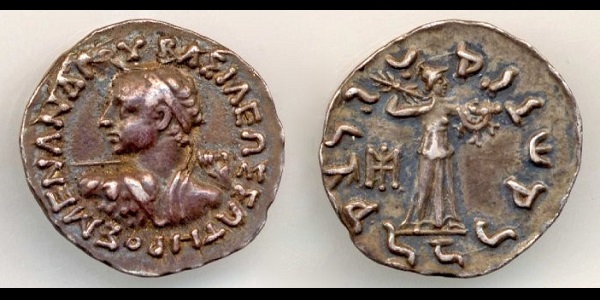// Archives
Berger, Boundaries, Buddhism: looking at a Greek coin
January 8, 2017
John Berger wrote that “the way we see things is affected by what we know or what we believe”; let’s consider particular ancient Greek coin in this light.
Subscribe by email
About this blog
This blog celebrates the work of teachers and students of Classics at the University of Nottingham, reflects on teaching developments and introduces some of the aspects of the Greek and Roman world that feature in our teaching.
The main contributor is Helen Lovatt, Associate Professor in Classics, who has published books on Greek and Roman epic, and articles on Latin literature and its reception, but other members of the department will also write guest posts.
Useful links
Recent posts
Categories
- 1980s
- advice on ancient religion
- Aeschylus
- Ancient Greek warfare
- Ancient senses
- Animals
- Anniversaries
- Archaeology
- Argonauts
- Aristophanes
- bodies
- CAARE
- CADRE
- Caesar
- circulation
- Classical archaeology
- Classical Association
- Classical reception
- Classics
- Classics and popular culture
- cognitive
- coins
- Collaboration
- Commodus
- conferences
- Egypt
- Emperors
- Epigraphy
- Euripides
- film
- first world problems
- Foul bodies
- Graeco-Roman
- Graeco-Roman religion
- Greek art
- Greek culture
- Greek drama
- Greek gods
- Greek History
- Greek literature
- Greek myth
- Greek poetry
- Greek religion
- Greek Tragedy
- Grumpy Roman
- heracles
- Herakles
- Hercules
- History of scholarship
- Homer
- Hoplites
- Isis
- ISYP
- Late antiquity
- Latin poetry
- Lists
- Lucian
- Martial
- music
- Nero
- Nerva
- Noses
- Octavian
- Opera
- Outreach
- Ovid
- Panoply
- papyrology
- Performanc
- Philosophy
- Pompeii
- QKolleg
- Research
- Resources
- Reviews
- Roman culture
- Roman history
- Roman Law
- Roman sculpture
- Roman social history
- Sappho
- Satyr drama
- seminar
- Shakespeare
- Slavery
- Smell
- Sophocles
- Sparta
- Teaching
- Teaching and Learning Ancient Religion
- television
- TLAR
- Uncategorized
- Visual Culture
- writing
Recent Posts
Archives
- May 2018
- April 2018
- March 2018
- February 2018
- January 2018
- December 2017
- November 2017
- October 2017
- March 2017
- February 2017
- January 2017
- October 2016
- September 2016
- July 2016
- June 2016
- May 2016
- April 2016
- January 2016
- November 2015
- October 2015
- September 2015
- August 2015
- June 2015
- May 2015
- April 2015
- March 2015
- February 2015
- January 2015
- December 2014
- November 2014
- October 2014
- September 2014
- August 2014
- July 2014
- June 2014
- May 2014
- April 2014
- March 2014
- February 2014
- January 2014
- December 2013
Categories
- 1980s
- advice on ancient religion
- Aeschylus
- Ancient Greek warfare
- Ancient senses
- Animals
- Anniversaries
- Archaeology
- Argonauts
- Aristophanes
- bodies
- CAARE
- CADRE
- Caesar
- circulation
- Classical archaeology
- Classical Association
- Classical reception
- Classics
- Classics and popular culture
- cognitive
- coins
- Collaboration
- Commodus
- conferences
- Egypt
- Emperors
- Epigraphy
- Euripides
- film
- first world problems
- Foul bodies
- Graeco-Roman
- Graeco-Roman religion
- Greek art
- Greek culture
- Greek drama
- Greek gods
- Greek History
- Greek literature
- Greek myth
- Greek poetry
- Greek religion
- Greek Tragedy
- Grumpy Roman
- heracles
- Herakles
- Hercules
- History of scholarship
- Homer
- Hoplites
- Isis
- ISYP
- Late antiquity
- Latin poetry
- Lists
- Lucian
- Martial
- music
- Nero
- Nerva
- Noses
- Octavian
- Opera
- Outreach
- Ovid
- Panoply
- papyrology
- Performanc
- Philosophy
- Pompeii
- QKolleg
- Research
- Resources
- Reviews
- Roman culture
- Roman history
- Roman Law
- Roman sculpture
- Roman social history
- Sappho
- Satyr drama
- seminar
- Shakespeare
- Slavery
- Smell
- Sophocles
- Sparta
- Teaching
- Teaching and Learning Ancient Religion
- television
- TLAR
- Uncategorized
- Visual Culture
- writing


Recent Comments